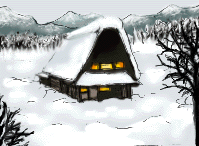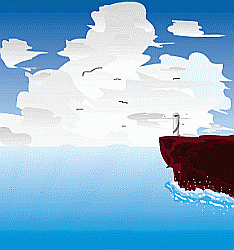|
Letter 23 ( Jan.20.2001 )
Dear friends, How are you?
I'm fine.
It has been very cold recently. According to TV news, it snowed heavily on the side of the Sea of Japan and some people were dead because of carbon-monoxide poisoning in the car and the fall from the roof (They were removing the snow from the roof.). Even in Shikoku it snowed, though not so much.
So today I'll read about "Season of Japan, winter(fuyu)" from "Japan - an illustrated Encyclopedia"(Kodansha).
| Seasons in Japan - Winter (fuyu).  The monsoon that brings winter to Japan develops as a series of anticyclones over Siberia in late November. It continues through the end of February, when the Siberian high recedes. The air that breaks out as the winter monsoon is part of a continental polar air mass that originates within the Siberian high area. This air mass begins dry and highly stable, but as it approaches the Sea of Japan it accumulates heat from the lower strata of the atmosphere and becomes increasingly unstable. At the same time it also picks up water vapor from the ocean. A characteristic cloud layer develops by the time the air mass reaches the central eastern sections of the Sea of Japan. When this air mass reaches the northern slopes of the Japanese archipelago, it ascends sharply, develops a thick layer of clouds, and drops a heavy snowfall. This mountainous region is called the "snow country," or yukiguni. Having dropped heavy snows on the windward side of Japan, the air mass is extremely dry by the time it passes over the mountain range of central Japan to the leeward side. Clouds disappear, and the sky remains clear for most of the winter. Snow and rain occasionally fall on the Pacific Ocean side of Japan during the winter, but this precipitation is due to extratropical cyclones originating in the East China Sea.
The monsoon that brings winter to Japan develops as a series of anticyclones over Siberia in late November. It continues through the end of February, when the Siberian high recedes. The air that breaks out as the winter monsoon is part of a continental polar air mass that originates within the Siberian high area. This air mass begins dry and highly stable, but as it approaches the Sea of Japan it accumulates heat from the lower strata of the atmosphere and becomes increasingly unstable. At the same time it also picks up water vapor from the ocean. A characteristic cloud layer develops by the time the air mass reaches the central eastern sections of the Sea of Japan. When this air mass reaches the northern slopes of the Japanese archipelago, it ascends sharply, develops a thick layer of clouds, and drops a heavy snowfall. This mountainous region is called the "snow country," or yukiguni. Having dropped heavy snows on the windward side of Japan, the air mass is extremely dry by the time it passes over the mountain range of central Japan to the leeward side. Clouds disappear, and the sky remains clear for most of the winter. Snow and rain occasionally fall on the Pacific Ocean side of Japan during the winter, but this precipitation is due to extratropical cyclones originating in the East China Sea.
|
The cold air mass which brought Japan this cold weather had also made Siberia freeze, they say. Looking around the world, it is said that the north-east coast of the US is also very cold.
Today is not so cold, but it will be cold for some more time. Take care of yourself not to have a cold, please.
Then next time!
|
Letter 24 ( Feb.18.2001 )
Dear friends, How are you?
I'm fine.
In Japan TV and newspapers report the sea disaster that Japanese fishing research ship was hit by the US submarine and nine people remain missing. Four of them are high school students. Knowing from the name of the ship "Ehime Maru", it belong to Ehime prefecture in Shikoku. Though I live in other side of Shikoku, I am anxious about them. Yesterday TV said that they found the ship in the sea. I hope it will be salvaged.
The students in the ship are all dreaming to live on the sea, I hear. Japan is surrounded by the sea on all sides. Though the role of airplanes has increased, that of the ships has never lost.
So today I'll read about "Kurosio(Black Stream)" from "Japan - an illustrated Encyclopedia"(Kodansha).
| Kuroshio(Black Stream)  Also known as the Japan Current. The largest ocean current in the sea off Japan. A warm current, originating in the area east of the Philippines, the Kuroshio flows northward between Taiwan and the island of Ishigakijima into the East China Sea. After passing along the Ryukyu Islands, it splits into two currents just south of Kyushu. The main current proceeds between the islands of Yakushima and Amami Oshima, flowing northeastward along Japan's Pacific coast. It turns east off northeastern Honshu, where it meets the cold southbound current known as OYASHIO. The branch current, known as the TSUSHIMA CURRENT, flows west of Kyushu and enters the Sea of Japan through the Tsushima Strait. Southwesterly winds blowing up to Japan over the Kuroshio contribute to Japan's muggy summers. The SANRIKU COAST, where the Kuroshio meets the Oyashio, is a rich fishing ground.
Also known as the Japan Current. The largest ocean current in the sea off Japan. A warm current, originating in the area east of the Philippines, the Kuroshio flows northward between Taiwan and the island of Ishigakijima into the East China Sea. After passing along the Ryukyu Islands, it splits into two currents just south of Kyushu. The main current proceeds between the islands of Yakushima and Amami Oshima, flowing northeastward along Japan's Pacific coast. It turns east off northeastern Honshu, where it meets the cold southbound current known as OYASHIO. The branch current, known as the TSUSHIMA CURRENT, flows west of Kyushu and enters the Sea of Japan through the Tsushima Strait. Southwesterly winds blowing up to Japan over the Kuroshio contribute to Japan's muggy summers. The SANRIKU COAST, where the Kuroshio meets the Oyashio, is a rich fishing ground.
|
Kuroshio is really black or dark violet. On the way to Kochi in the school excursion about forty years ago, I saw it for the first time. At that time I was really moved. I thought that it is natural that Sakamoto Ryoma looking at the Pacific Ocean had thought of the world. This is an unfortunate accident but I hope the students would have their dream.
Then next time!
|
 The monsoon that brings winter to Japan develops as a series of anticyclones over Siberia in late November. It continues through the end of February, when the Siberian high recedes. The air that breaks out as the winter monsoon is part of a continental polar air mass that originates within the Siberian high area. This air mass begins dry and highly stable, but as it approaches the Sea of Japan it accumulates heat from the lower strata of the atmosphere and becomes increasingly unstable. At the same time it also picks up water vapor from the ocean. A characteristic cloud layer develops by the time the air mass reaches the central eastern sections of the Sea of Japan. When this air mass reaches the northern slopes of the Japanese archipelago, it ascends sharply, develops a thick layer of clouds, and drops a heavy snowfall. This mountainous region is called the "snow country," or yukiguni. Having dropped heavy snows on the windward side of Japan, the air mass is extremely dry by the time it passes over the mountain range of central Japan to the leeward side. Clouds disappear, and the sky remains clear for most of the winter. Snow and rain occasionally fall on the Pacific Ocean side of Japan during the winter, but this precipitation is due to extratropical cyclones originating in the East China Sea.
The monsoon that brings winter to Japan develops as a series of anticyclones over Siberia in late November. It continues through the end of February, when the Siberian high recedes. The air that breaks out as the winter monsoon is part of a continental polar air mass that originates within the Siberian high area. This air mass begins dry and highly stable, but as it approaches the Sea of Japan it accumulates heat from the lower strata of the atmosphere and becomes increasingly unstable. At the same time it also picks up water vapor from the ocean. A characteristic cloud layer develops by the time the air mass reaches the central eastern sections of the Sea of Japan. When this air mass reaches the northern slopes of the Japanese archipelago, it ascends sharply, develops a thick layer of clouds, and drops a heavy snowfall. This mountainous region is called the "snow country," or yukiguni. Having dropped heavy snows on the windward side of Japan, the air mass is extremely dry by the time it passes over the mountain range of central Japan to the leeward side. Clouds disappear, and the sky remains clear for most of the winter. Snow and rain occasionally fall on the Pacific Ocean side of Japan during the winter, but this precipitation is due to extratropical cyclones originating in the East China Sea.
 Also known as the Japan Current. The largest ocean current in the sea off Japan. A warm current, originating in the area east of the Philippines, the Kuroshio flows northward between Taiwan and the island of Ishigakijima into the East China Sea. After passing along the Ryukyu Islands, it splits into two currents just south of Kyushu. The main current proceeds between the islands of Yakushima and Amami Oshima, flowing northeastward along Japan's Pacific coast. It turns east off northeastern Honshu, where it meets the cold southbound current known as OYASHIO. The branch current, known as the TSUSHIMA CURRENT, flows west of Kyushu and enters the Sea of Japan through the Tsushima Strait. Southwesterly winds blowing up to Japan over the Kuroshio contribute to Japan's muggy summers. The SANRIKU COAST, where the Kuroshio meets the Oyashio, is a rich fishing ground.
Also known as the Japan Current. The largest ocean current in the sea off Japan. A warm current, originating in the area east of the Philippines, the Kuroshio flows northward between Taiwan and the island of Ishigakijima into the East China Sea. After passing along the Ryukyu Islands, it splits into two currents just south of Kyushu. The main current proceeds between the islands of Yakushima and Amami Oshima, flowing northeastward along Japan's Pacific coast. It turns east off northeastern Honshu, where it meets the cold southbound current known as OYASHIO. The branch current, known as the TSUSHIMA CURRENT, flows west of Kyushu and enters the Sea of Japan through the Tsushima Strait. Southwesterly winds blowing up to Japan over the Kuroshio contribute to Japan's muggy summers. The SANRIKU COAST, where the Kuroshio meets the Oyashio, is a rich fishing ground.